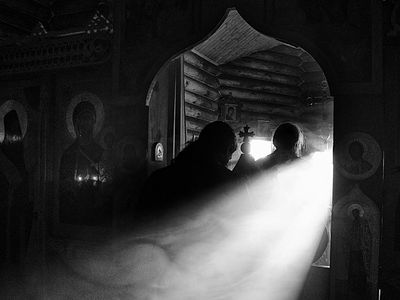Jesus didn’t suffer so that we wouldn’t have to. He suffered so that we could handle suffering with him.
In other forms of Christianity, one is often told that Christ suffered and died so that we could be freed from a similar fate. A focus in Protestant theology is Christ appeasing the wrath of the Father, freeing us from a rightful punishment.
But for the Greek fathers and Orthodox Christianity, the focus is largely on Christ as the Great Physician—the God who suffers and dies so that he can wipe away our sins, cleanse us from defilement, and reunite us with the Father in him. Rather than presenting a Trinitarian nightmare in which the Father and Son are at odds, Orthodox Christology declares that Christ voluntarily lays down his life for the sake of the world—and that this is the unified, Divine will. In other words, while we are sinners, Christ dies for us.
One of my personal struggles is that of a severe and even crippling empathy. I have trouble disassociating myself from the sufferings or experiences of others, grafting their experiences into my own. In these times of distress, I can turn to prayer, petitioning God for his mercies. But in these prayers, I catch myself assuming that suffering is only a negative. While it might seem noble to ask for God’s deliverance, we should adjust our hearts and prayers in light of what I wrote already: “Christ suffered so that we could handle suffering with him.” Better than praying for deliverancefrom suffering, we must pray for salvation through suffering.
In the Christian context, hope is inextricably linked with suffering. Of this, the apostle Paul writes (Rom. 8:16–18):
The Spirit Himself beareth witness with our spirit, that we are children of God. And if children, also heirs—on the one hand heirs of God, on the other hand joint-heirs of Christ, if indeed we suffer with Him, in order that we might also be glorified together. For I reckon that the sufferings of the present time are not worthy in comparison to the future glory to be revealed in us.
Paul is speaking here of “adoption” (Rom. 8:14–15). As Christians, we are adopted into God’s family. But if we are to receive our inheritance (as God’s children), we are called to suffer, becoming “joint-heirs” of the true Son of God. This, Paul explains, is why we endure the “sufferings of the present time,” living according to hope.
A falsehood spread throughout the broader Christian world today is that God adopts us into his family without anything expected of us. Or even worse, we are promised a better life, happiness, and even material wealth or worldly success. But this is really the opposite of what the scriptures promise. Paul again reminds us that “we were saved by hope” (Rom. 8:24). Our salvation is not realized immediately, nor is it a ‘flip of the switch’ in one’s mental assent of faith, but is rather a journey that begins in Baptism and is consummated on the Last Day. And until that day, we are awaiting our true salvation. From the beginning of our salvation journey to the end is a whole lifetime of trials, temptations, suffering, discipline, asceticism, struggle, and growth.
Being “saved in hope” also means knowing in whom we place our trust:
Who shall separate us form the love of Christ? Affliction, or distress, or persecution, or famine, or nakedness, or danger, or sword? . . . But in all these things we more than conquer through the One Who loved us. — Rom. 8:35,37
While we are almost guaranteed a life marked by affliction, distress, persecution, famine, nakedness, danger, and sword, we have assurance of victory through the love of Christ. Our hope is in him. He is our assurance, just as he is true Life.
Since we are guaranteed as much, our prayer should be to see suffering transformed into salvation. As Elder Paisios has said:
In every test, let us say: “Thank you, my God, because this was needed for my salvation.”
Similarly, Fr. Seraphim Rose:
Only struggle a little more. Carry your cross without complaining. Don’t think you are anything special. Don’t justify your sins and weaknesses, but see yourself as you really are. And, especially, love one another.
When faced with struggle or temptation, ask God that we might struggle a little more. Give thanks to God that we are being provided an opportunity for our sanctification and salvation in him. Look to Christ as a source of strength—as one who suffered all, and yet without sin. Consider the lives of the Saints, who have imaged Christ in their own struggles.
In the end, remember that Christ didn’t suffer so that we wouldn’t have to. He suffered, died, and conquered death-by-death so that we could handle suffering with him. Casting our lot with Christ is a calling to suffering, a calling to carry a Cross—whether great or small.
But through Christ, through the mysteries of the Church, and through our own individual struggle and ascesis, we can live as co-heirs of him, prepared for future glory.





